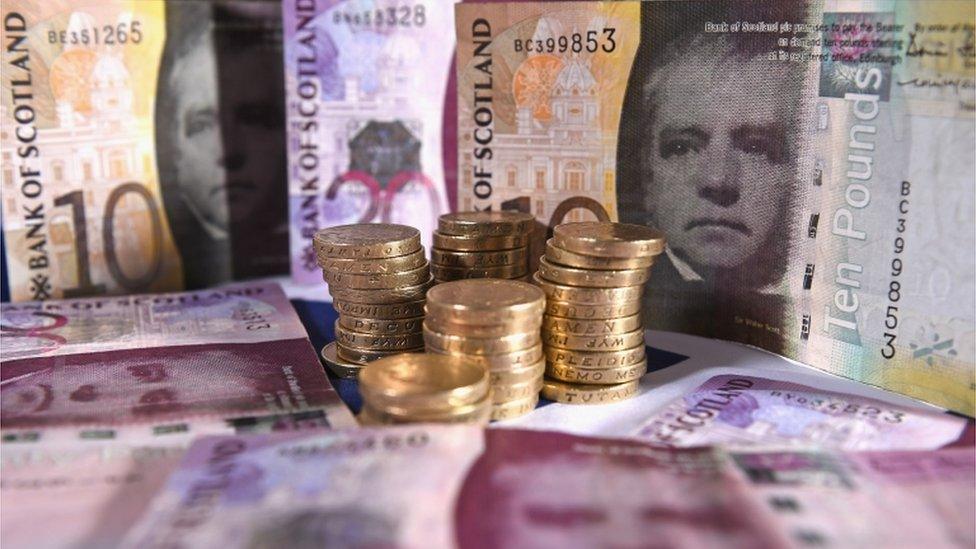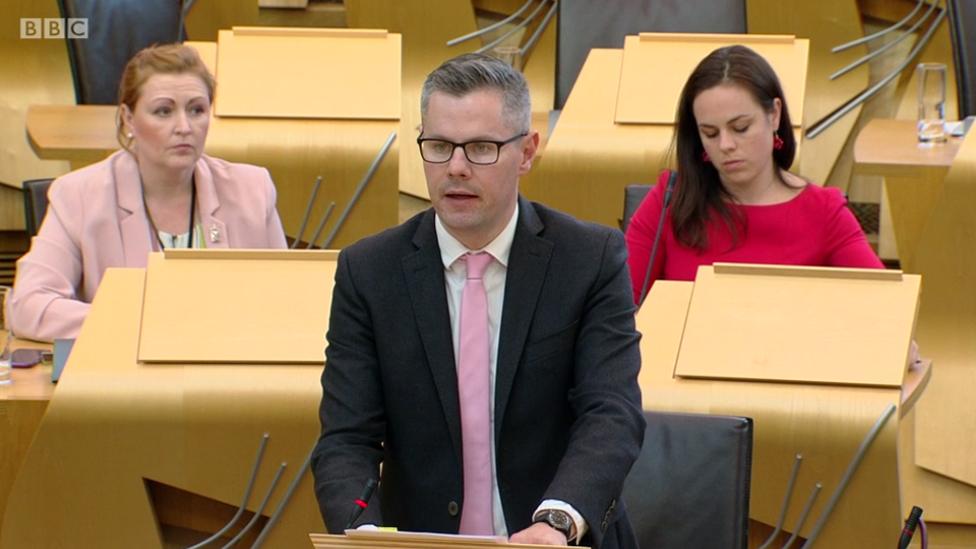Scottish business rate reforms confirmed
- Published

A key change to Scotland's business rates system will make the country "the most competitive place in the UK for businesses", MSPs have been told.
Finance Secretary Derek Mackay was speaking as he confirmed he would implement the vast majority of recommendations made by a review.
This will include the business growth accelerator, which means new build properties will not pay rates.
He also confirmed that nurseries will be fully exempt from business rates.
And he confirmed a cap in rate rises for the hospitality sector and offices in Aberdeen and Aberdeenshire, first announced in February, will continue next year with an additional 12.5% cap in real terms.
Mr Mackay's announcements were broadly welcomed by business organisations, who said the Scottish government had committed to a "mostly sensible programme of rates reform".
It follows the Barclay Report into non-domestic rates that was commissioned by the Scottish government last year and headed by Ken Barclay, the former head of Scottish operations for RBS.
As he gave his formal response to the report at Holyrood, Mr Mackay confirmed he would seek to implement the "vast majority" of its 30 recommendations.
This will include the growth accelerator, which means that from 1 April next year every new build non-residential property will not pay any rates until it is occupied for the first time.
After that, the new tenant will benefit from a year without rates.
Of all its recommendations, the Barclay review felt this would give Scotland the edge in attracting investment and growing the economy.

Mr Mackay urged businesses to "come to Scotland and invest in Scotland"
It found that the current system whereby improvements in a property led immediately to increases in the rates bill often deterred investment.
Mr Mackay said that the new measures, combined with the more favourable rates of Land and Buildings Transaction Tax on commercial transactions, would make Scotland "the most competitive place in the UK for businesses to invest and grow".
The finance secretary also confirmed that day nurseries will not pay any business rates from April of next year.
He also said revaluations will be carried out every three years in future rather than every five years, and would be based on data from the previous year rather than from two years before.

What are business rates?
Unlike domestic homeowners, Scotland's businesses don't pay council tax. Instead, they pay business rates.
The amount shops, offices, pubs, hotels, warehouses and factories pay is based on a "rateable value". This valuation of a property is broadly based on an analysis of what annual rental values would be.
A combination of the rateable value and the poundage rate make up what businesses pay.
There are a range of rate "relief" schemes that can change the amount a business actually pays.

However, Mr Mackay said some other proposals needed "further consideration and engagement".
These included removing charity relief for arms-length organisations, independent schools and university accommodation, and the reform of relief for sports clubs, empty properties and properties in active occupation and the levying of rates on parks.
Mr Mackay said a final decision on all of these would be made by the end of the year, while a recommendation to reduce the large business supplement to 1.3p - which would bring it into line with the rest of the UK - will be implemented "should it become affordable" by the end of the current parliament.
He also stressed that the government remained committed to the small business bonus, which gives varying levels of rates relief to businesses whose premises have a total rateable value of £35,000 or less.
But a review will be carried out to ensure that it "maximizes the economic and social benefits of the scheme".
Mr Mackay said: "My message to business after announcing this package is clear. Come to Scotland. Invest in Scotland, and grow your business in Scotland.
"The recommendations that we will take forward and the additional measures, beyond Barclay, that I have announced today demonstrate our ambition for the economy, and our desire to work with the business community to deliver upon that ambition.
"Once implemented, we will have a rates system that is fairer, more responsive and geared for growth."
'Shot in the arm'
Andy Willox of the Federation of Small Businesses said: "The Scottish government has committed to a mostly sensible programme of rates reform that's a product of the art of the possible.
"Growing firms should now be able to recoup some of their costs before being hit with a bigger rates bill. A three-year revaluation cycle should mean that businesses' bills better reflect economic conditions. New relief for Scottish nurseries should give these important local businesses a much needed shot in the arm.
"These are all sensible measures which FSB is pleased to back."
The Scottish Retail Consortium said it was pleased to see steps to modernise the "creaking" rates system, but warned that the overall rates burden will "remain onerous, at a time when retailers are already having to grapple with profound changes in shopping habits and other growing costs".
Conservative MSP Murdo Fraser said there was much in the report he agreed with, but questioned why Mr Mackay was keeping open the possibility of ending relief for sports clubs.
Labour's Jackie Baillie noted the Barclay review was tasked with drawing up proposals that were revenue neutral and said Mr Mackay had given "no indication of revenue raising measures" in his statement.
And the Scottish Greens welcomed the announcement of a review of the "flawed" small business bonus scheme.